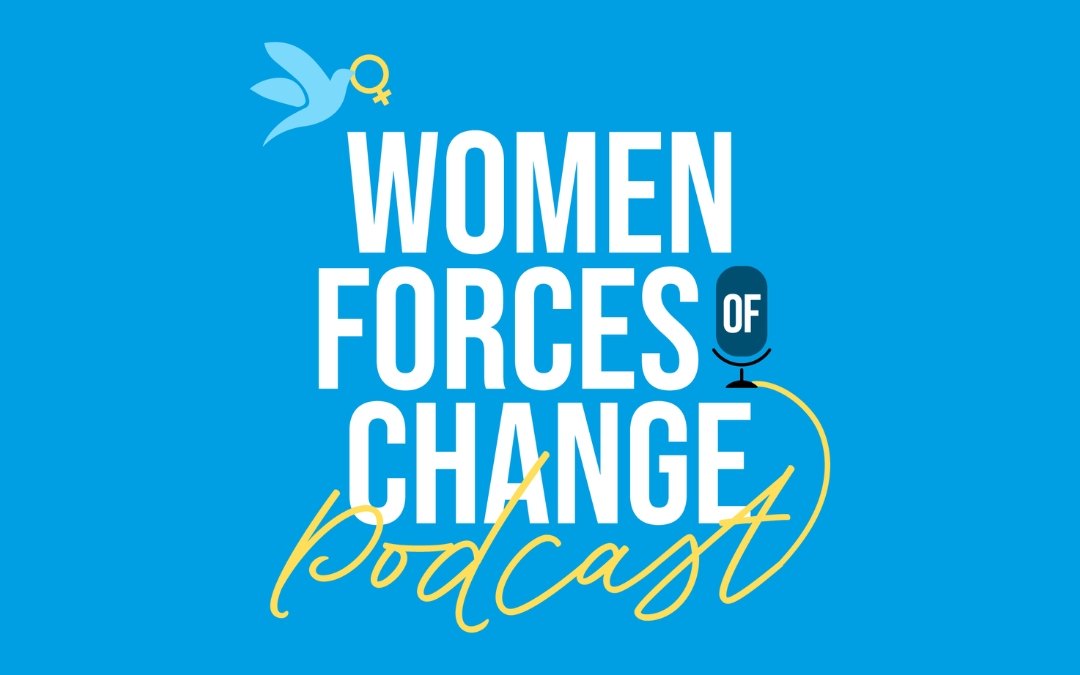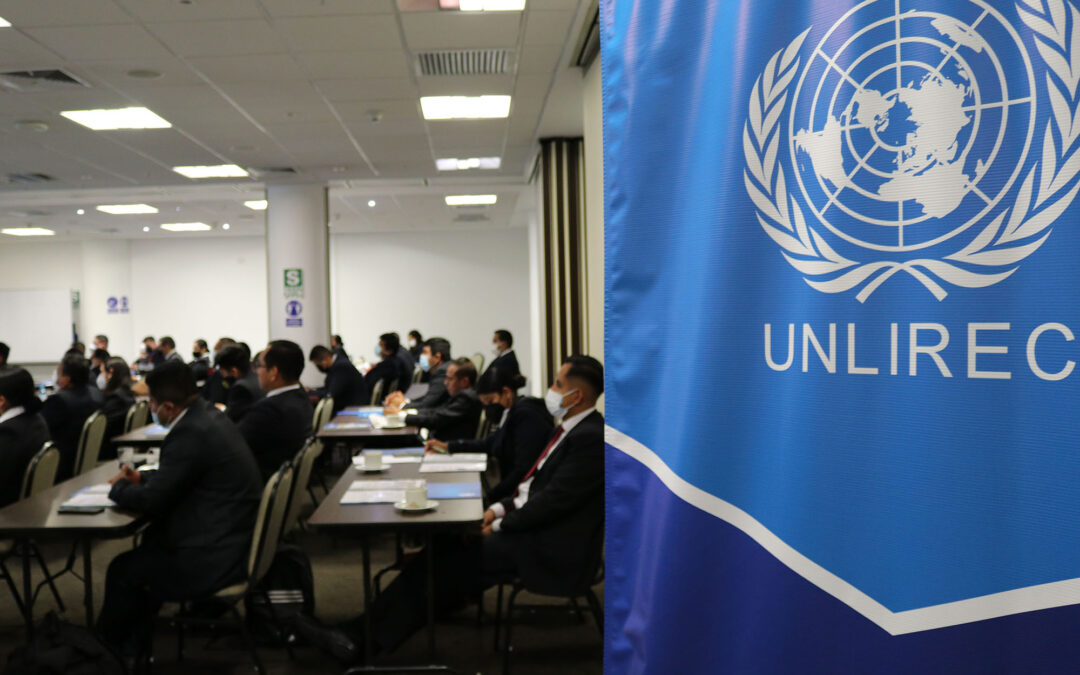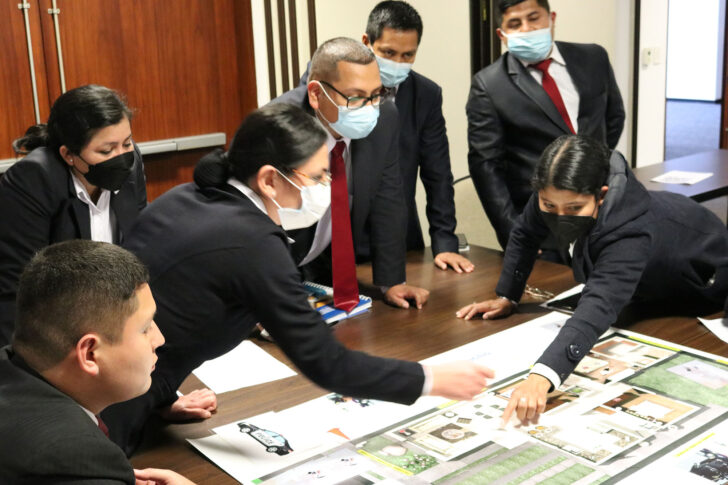
Nov 15, 2024 | Conventional Arms Programme
NEW YORK, 11 November (Office for Disarmament Affairs) — The United Nations Regional Centre for Peace, Disarmament and Development in Latin America and the Caribbean (UNLIREC) is delighted to announce the launch of its new podcast series, Women, Forces of Change: The Podcast, which is dedicated to highlighting the voices of women from Latin America and the Caribbean who work in disarmament.
Over the course of 10 episodes, listeners will be invited to reflect on the importance of women’s voices in peace, security and disarmament. “At UNLIREC, we are proud to provide a platform that celebrates and supports women who are making forward strides in traditionally male-dominated fields,” said Soledad Urruela, Director of UNLIREC. “This podcast will spotlight their achievements, the challenges they overcome, and their vision for a safer and more equitable world.”
Women, Forces of Change: The Podcast features a diverse lineup of women, including experts, diplomats, policymakers and civil society leaders from across Latin America and the Caribbean, who will share their personal journeys and insights on advancing peace and security worldwide.
Featured guests include inspiring women leaders such as Kettly Julien (Haiti), Ana Pamela Romero (Mexico), Mayla Alejandra de León (Guatemala), Clarissa Rojas (Peru), Elizabeth Ward (Jamaica), Tamika Henry (Guyana), Nadine Bushell (Trinidad and Tobago), Constanza Bucarey (Chile), Carina Solmirano (Argentina) and Juliana Aguiar (Brazil). A special episode will feature Maritza Chan Valverde, Permanent Representative of Costa Rica to the United Nations, and Dennis Francis, Permanent Representative of Trinidad and Tobago to the United Nations, who, together with Ms. Urruela, will reflect on the progress in the United Nations General Assembly resolution on women, disarmament, non-proliferation and arms control. The podcast series launched on 8 November and will run for a month, with the final episode airing on 8 December to coincide with the fourteenth anniversary of the adoption of the resolution.
Women, Forces of Change: The Podcast will be available on platforms, such as Spotify and YouTube, and will feature conversations in English, Spanish and French.
For more information, please visit https://unlirec.org/en/publicacion/women-forces-of-change-the-podcast/ and follow UNLIREC on Instagram, Facebook, X (Twitter) and LinkedIn.
Background
Women, Forces of Change: The Podcast is funded by the Government of Canada and is aimed at strengthening and promoting the key role of Latin American and Caribbean women in disarmament and security in the region.
This podcast series builds on UNLIREC’s original publication series Women, Forces of Change, which has highlighted the contributions and perspectives of over 200 women in disarmament since 2012.
About UNLIREC
The United Nations Regional Centre for Peace, Disarmament and Development in Latin America and the Caribbean, is one of three regional centres under the United Nations Office for Disarmament Affairs. Since its establishment in 1986, the Regional Centre for Peace, Disarmament and Development in Latin America and the Caribbean has worked to promote peace, security and disarmament in the region.
For more information, please contact information@unlirec.org.

Oct 16, 2024 | Conventional Arms Programme
From 7 to 16 October 2024, the United Nations Regional Center for Peace, Disarmament and Development (UNLIREC), with the support of the National Police University of Honduras, conducted the virtual Specialised course on firearms investigation from a gender perspective. A total of 47 officers from various units and departments successfully completed the course.
The course aimed to raise awareness among participants about the importance of incorporating a gender perspective in the investigations of crimes involving firearms. It also strengthened technical knowledge related to the scientific method of criminal investigation and promoted inter-institutional cooperation in these areas.
Delivered through a combination of synchronous and asynchronous sessions, the course covered both theoretical and technical aspects of criminal investigation. It emphasized how gender-sensitive analysis contributes to conclusions free from stereotypes, grounded in objective technical or scientific evidence. Case studies were used to highlight the consequences of overlooking gender perspectives, including the violation of victim´s rights and the impact on their families.
Special attention was given to the use of firearms in various forms of violence against women, not only as instruments of femicides, but also as tools of intimidation, coercion and threats. The training underscored the importance of proper crime scene management and the handling of firearms and ammunition as physical evidence in gender-sensitive investigations.
Participants received recommendations and were encouraged to strengthen cooperation among all actors involved in the judicial investigation process. This collaborative approach is essential to effectively to address firearms-related crimes, particularly those involving gender-based violence, and to reduce impunity while enhancing the capacities of justice and security institutions.
The course was made possible through funding from the SALIENT initiative (The Savings-Lives Entity) under the project ´Improving citizen security by strengthening arms control policies and armed violence prevention frameworks in Honduras´.

Jun 20, 2023 | Conventional Arms Programme
From 20 June – 29 June, 2023, close to thirty (30) law enforcement officers and public officials from Suriname will enhance their skills on gender-sensitive firearms-related criminal investigations with the support of the United Nations Regional Centre for Peace, Disarmament and Development in Latin America and the Caribbean (UNLIREC), in collaboration with The Directorate National Security of Suriname for the virtual Specialised Course on Firearms Investigations from a Gender Perspective (FIGP).
The FIGP is aimed at strengthening participants’ technical knowledge on gender-sensitive firearms-related criminal investigations. Members of The Korps Police Suriname, Attorney General’s Office, Directorate National Security and Military Police are participating in the course.
During the opening, the representative of National Coordination of the Ministry of Public Security of Suriname,Ms Jennifer Harnandan said that “Almost one third of the number of killings in the country are a result of domestic violence, the majority of which are perpetrated against women”. In view of this and other facts, she also highlighted that “This course will allow for collaboration between actors from the Suriname Police Force, National Security and police prosecutors.”
The course will train participants to apply gender perspectives to criminal firearms investigations as a complementary method of analysis, thereby contributing to formulating hypotheses that are free from stereotypes, as well as to identifying evidence of gender-based violence, and ensuring the respect of human rights of the victims and survivors. The use of firearms to perpetuate violence against women can not only lead to fatalities, but the weapons are also used to threaten, intimidate, and coerce women.
This activity is part of the Canada funded project in support of the implementation of the Caribbean Firearms Roadmap.
With initiatives such as this one, the Government of Suriname, with the technical assistance of UNLIREC, demonstrates its commitment to the prevention and elimination of violence against women.

Aug 4, 2022 | Conventional Arms Programme
On 3 and 4 August 2022, United Nations Regional Centre for Peace, Disarmament and Development in Latin America and the Caribbean (UNLIREC) in partnership with the Ministry of Foreign Affairs and Directorate of Criminal Investigation of the Peruvian National Police (DIRCRI-PNP), held the first in-person edition of its Specialised Course on Firearms Investigations from a Gender Perspective (FIGP).
The course is aimed at sensitising participants on the importance of gender mainstreaming in crimes committed with firearms and strengthen their relevant technical knowledge about scientific methods of criminal investigations, as well as inter-institutional cooperation in these areas.
During the course, General Luis Miguel Gamarra Chavarry, Director of DIRCRI-PNP stressed the importance of developing gender-sensitive criminal investigation skills to solve crimes against women: “We consider it [this training] important because it allows us to examine the crime scene free from stereotypes, free from thoughts opposed to women, and to do an adequate job.” He highlighted the support of UNLIREC in capacity building to provide a better service to society: “This benefits the public because we are able to shed light on these crimes rather than the investigation being left in suspense; instead it allows us to identify the responsibility of individuals and supports the judiciary and the Public Prosecutor’s Office.”
Forty-one investigators and experts from different departments of the DIRCRI participated, including representatives from Ballistics and Forensic Explosives, Criminal Investigation, Criminalistic Inspections, Human Trafficking Investigation Division, Forensic Computer Graphic, among others.
What is FIGP?
The Specialised Course on Firearms Investigations from a Gender Perspective (FIGP) addresses both theoretical and technical aspects in criminal investigations and how gender mainstreaming, as a method of analysis, contributes to drawing conclusions free of stereotypes, based on technical and scientific research.
This was put into practice with an analysis of different cases to reflect how the absence of a gender perspective leads to the violation of rights of the victims and their families.
During the training, it was highlighted that firearms are used to commit different types of violence against women, so not only as a murder weapon, but also as an instrument to threaten, intimidate and coerce.
The importance of the correct handling of the crime scene and of firearms and ammunition as physical evidence, the need for a gender-sensitive investigation of crimes was also emphasised. Recommendations were shared and participants were urged to strengthen the coordination and cooperation between all actors involved in the different stages of the judicial investigation.
This activity concluded the project ´Supporting gender mainstreamed policies, programmes and actions in the fight against small arms trafficking and misuse´ in Latin America and the Caribbean, funded by the European Union.

Jul 14, 2022 | Conventional Arms Programme
On 14 July, the United Nations Regional Centre for Peace, Disarmament and Development in Latin America and the Caribbean (UNLIREC) organized a virtual regional forum for Latin American countries which focused on measuring violence against women and the involvement and impact of firearms. During the forum, countries presented different initiatives and policies which assist with measuring the frequency and effects of firearms involved in violence against women.
The Women’s Office of the Supreme Court Justice of Argentina presented its methodology for documenting and analysing femicides which have been committed with firearms, while the General Directorate of Statistics and Censuses (DIGESTYC) of El Salvador highlighted the Gender Statistics Observatory. The Intersecta Organisation for Equality shared findings from a recent study on gender-based violence and firearms in Mexico, emphasizing the importance of complementary information sources alongside administrative reports, to better understand the actual magnitude of armed violence against women.
Similarly, the Centre of Excellence for Government Statistical Information, Public Security, Victimisation and Justice (UNODC-INEGI) presented a statistical framework for the measurability of femicides, while the Economic Commission for Latin America and the Caribbean (ECLAC) focused its intervention on advances and challenges in measuring femicide rates in Latin America.
The event showcased the negative impacts of firearms when involved in different acts of violence against women and existing challenges on determining and counting femicides. Comprehensive data collection is vital for building an evidence base which should inform policy making in order to prevent and eliminate such violence.
Participants at the event included representatives working in arms control, security, the prevention of violence against women, gender, justice, statistics, and other public sectors and drew participation from Argentina, Columbia, Costa Rica, the Dominican Republic, El Salvador, Guatemala, Honduras, Mexico, and Panama as well as representatives from the United Nations, regional organisations, and civil society.
This event was funded by the European Union and is part of the global project ‘Supporting gender mainstreamed policies, programmes, and actions in the fight against small arms trafficking and misuse, in line with the Women, Peace and Security agenda´.









